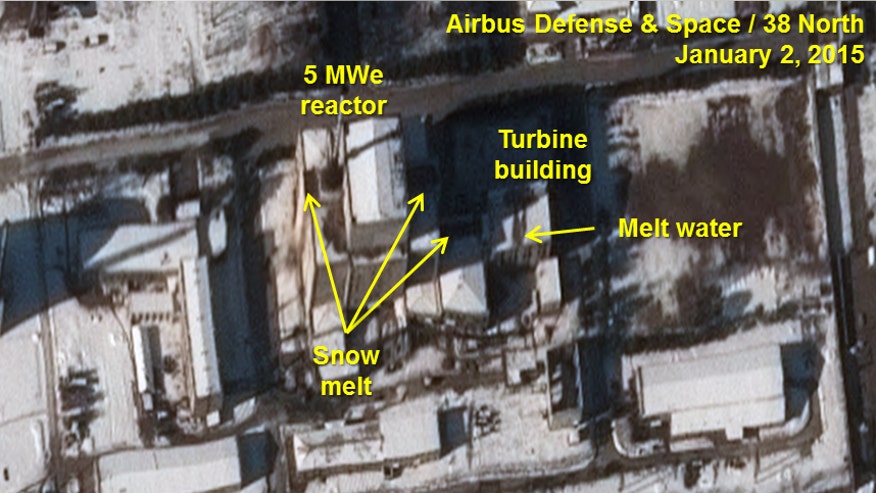North Korea might be restarting nuke plant, US institute says
Published January 29, 2015Associated Press
0 Twitter
0 Email

Jan. 2, 2015: U.S.-Korea Institute at the Johns Hopkins School of Advanced International Studies shows an annotated satellite photo indicating signs of new activity at the 5 MWe Plutonium Production Reactor at North Korea’s Nyongbyon Nuclear Scientific Research Center. (AP)
SEOUL, South Korea – North Korea may be attempting to restart its main nuclear bomb fuel reactor after a five-month shutdown, a U.S. research institute said Thursday.
If true, the finding, which is based on recent commercial satellite imagery, will be an added worry for the United States and the North's neighbors at a time of increasing animosity over recent U.S. sanctions against the North and Pyongyang's fury about a U.N. push to punish its alleged human rights abuses.
ADVERTISEMENT
Activity at the 5-megawatt Nyongbyon reactor is closely watched because North Korea is thought to have a handful of crude nuclear bombs, part of its efforts to build an arsenal of nuclear tipped missiles that could one day hit America's mainland. Nyongbyon, which has produced plutonium used for past nuclear test explosions, restarted in 2013 after being shuttered under a 2007 disarmament agreement. It has been offline since August.
Possible signs in satellite imagery from Dec. 24 through Jan. 11 that the reactor is in the early stages of being restarted include hot water drainage from a pipe at a turbine building that indicates steam from the reactor and growing snow-melt on the roofs of the reactor and turbine buildings.
The U.S.-Korea Institute at Johns Hopkins School of Advanced International Studies, however, said that since the recent observation period was only about two weeks, it's too soon to reach a definitive conclusion about what's happening and more monitoring is needed. The institute's website, 38 North, published the findings.
Nyongybon can likely produce about one bomb's worth of plutonium per year. A uranium enrichment facility there could also give it a second method to produce fissile material for bombs. It is not clear if North Korea has yet mastered the technology needed to make warheads small enough to be mounted on missiles, but each nuclear test presumably moves its scientists closer toward that goal.
North Korea has said it is willing to rejoin international nuclear disarmament talks last held in 2008, but Washington demands that it first take concrete steps to show it remains committed to past nuclear pledges.
The United States also rejected a recent North Korean offer to impose a temporary moratorium on its nuclear tests if Washington scraps its annual military drills with Seoul; Pyongyang claims those drills are invasion preparation. The U.S. called the linking of the military drills, which it says are defensive and routine, with a possible nuclear test "an implicit threat."
Always rocky ties between Pyongyang and Washington dipped lower because of a recent Hollywood movie depicting the assassination of North Korean leader Kim Jong Un. The U.S. blames the North for crippling hacking attacks on the movie's producer, Sony, and subsequently imposed new sanctions on the country, inviting an angry response from Pyongyang, which has denied responsibility for the cyberattacks.




 An artist’s concept of a near-Earth asteroid flying close to Earth.
An artist’s concept of a near-Earth asteroid flying close to Earth. RSS Feed
RSS Feed
